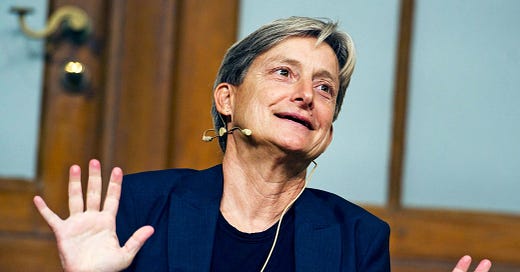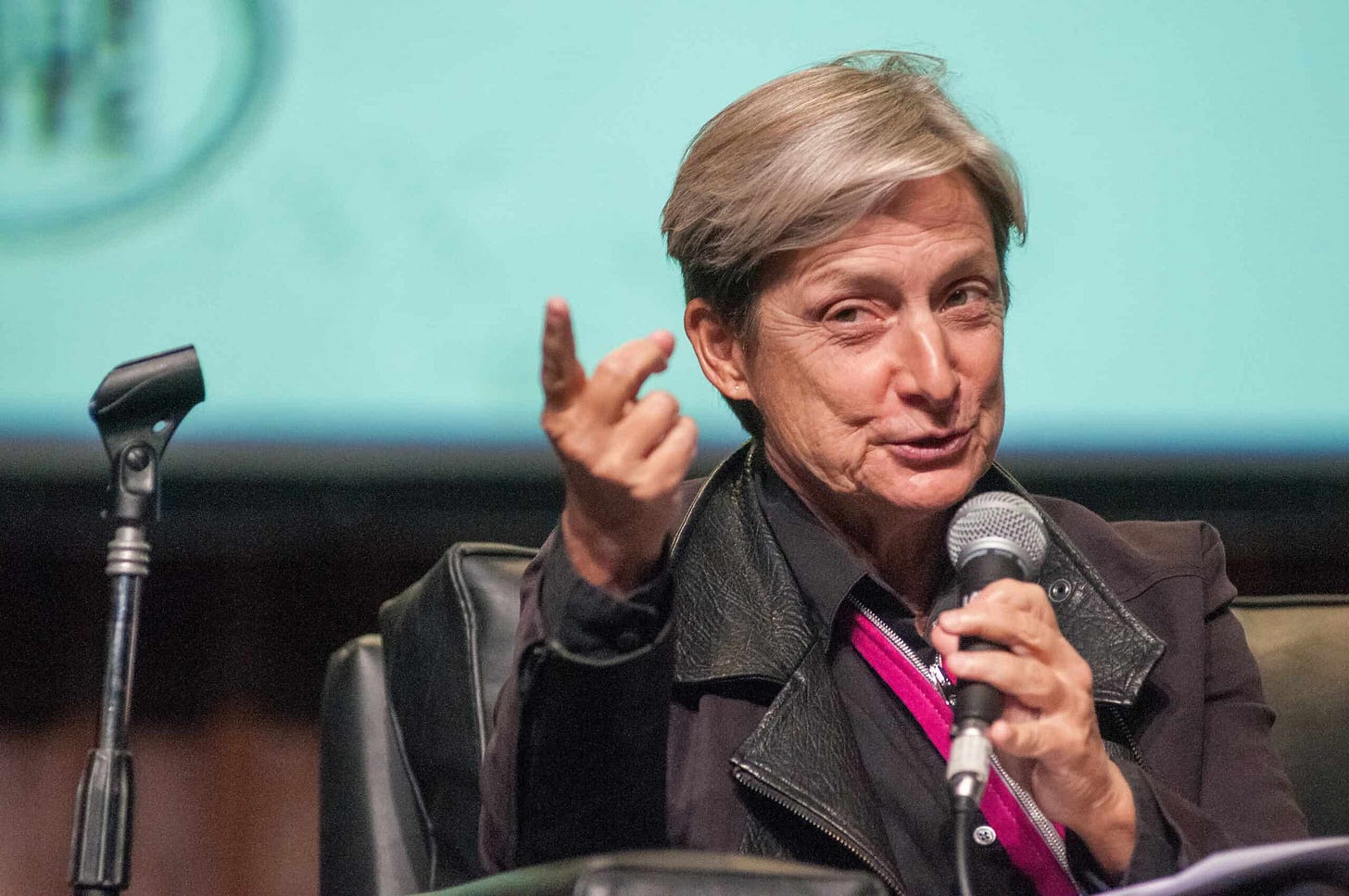Continuing in my series for Pride Month, let me remind you of the purpose. These so-called “heroes” lived lives of “activism” and “helping the marginalized.” They are held up as people that the young should imitate. ASU’s library commands us to “Celebrate” them. Yet when we take an honest look at their lives, we see that they were hypocrites who harmed the very marginalized they claimed to defend. They offer no ideas on how to receive a new heart or find redemption. They lead their followers with promises of liberation, only to march them straight into the utter meaninglessness of “do as I say, not as I do” and imprisonment to sin.
Judith Butler is one of the most celebrated intellectuals behind the modern LGBTQ+ movement. A philosopher by trade, Butler has been crowned the patron saint of gender fluidity. She is best known for teaching us that gender isn’t something we are—it’s something we perform. Like a Broadway show, but with less coherence and worse costumes.
But before she denied the existence of objective reality as a mere power relation, Butler was raised in a Jewish home in Cleveland. As a form of discipline, her parents sent her to Hebrew school, hoping, perhaps, that a little theology would straighten her out. It did the opposite. There, she began grilling rabbis with tough philosophical questions: Why can only men read the Torah in services? Who decides what the Torah means? Underneath these lay a deeper question, one that shaped her thinking for decades: Why does God permit evil—especially in light of Jewish suffering?
She didn’t find answers that satisfied her. So she turned, instead, to Hegel. From him, she learned that all is one, that distinctions are illusions, and that we are climbing a dialectical staircase toward divinization. Everything is performance (all is one). Even performance is performance. Followed consistently, only the ego and its ideas/desires exist; there is no material world by which to test ideas and define simple concepts like “man and woman.” The psychoanalytic process is no longer about integration into reality but about conforming reality into whatever the ego wants.
Why is there suffering? Suffering is due to social constructs that interfere with individual desires, constructs imposed upon the individual ego by a judgmental society seeking to defend its power structures (this is foreshadowing something to come). And if suffering is constructed, then it can be deconstructed. If reality is imposed, then it can be reimagined. Truth is no longer discovered; it is declared.
If you think you’re a they/them, then you are. That’s all it takes. Just think it—and it is so.
There is no objective reality by which to test this. No external world to provide correction. The scientific method—laughable! Biology—repressive! That old wives' tale that all human babies come from one biological mother and one biological father—how quaint! Gone is the humility of science and the moral law of God; in their place stands the imagination of the self, armed with a self-contradiction and a moralistic platitude. She even asserts that believing in two sexes is fascism!
But here’s where the rubber meets the road.
For all her public moralism about power, justice, and women's rights, Butler was strangely silent—indeed, complicit—when it really mattered. When the #MeToo movement urged us to "believe victims," Butler didn’t. In fact, she did the opposite. She wrote a private, behind-the-scenes letter to the president of NYU defending her close friend and fellow gender theorist, who had been accused by a graduate student of sexual abuse and manipulation.
Let that sink in: Butler, long-time critic of power abuse and patriarchal academia, used her own power to shield an alleged abuser from consequences. She didn’t rush to defend the vulnerable. She rushed to protect the powerful—because that powerful person was one of her own.
This is the same Judith Butler who has built a career decrying systems of oppression, who teaches entire generations that moral hierarchies are tools of domination. But when a real moral test arrived, she flunked it. Not because she misunderstood her theory—but because she lived it out.
She later expressed some regret that maybe she may have defended privilege. Weak. But here’s the thing: before you start thinking “hey, we all make mistakes,” you must remember that isn’t the standard she has imposed on others. She demanded works righteousness conformity to her intersectionality power structure activism. There is no grace and no redemption. She can say “whoops” all she wants, but what this exposes is that in old age, after a lifetime of gender activism, she is committing heinous wrongs and has seen no personal transformation.
As the fool said to King Lear: you shouldn’t have grown old until you grew wise.
Sadly, there is no such thing as wisdom for Butler because that requires objective reality, and the ego must deny itself to pursue truth. Wisdow laughs at her claim that “all is performance.”
You see, Butler’s gender theory has no room for integrity, no path to repentance, and no standard of justice beyond power itself. The ego is the highest standard. Her entire worldview boils down to this: “Do what you think is true. Reality is what you say it is.” Which works just fine—until she has more power and decides that you are the problem. Then letters are written to defend her friends.
Are you starting to see a theme behind these heroes?
This is what makes her a hero of Pride Month. Not because she offered a path to redemption or renewal. She didn’t. But because she gave the movement a philosophical excuse (albeit a nonsensical one) to cast off all restraint—gender, biology, objectivity, morality—and replace them with the ego and its desires.
What’s the pattern in what these heroes taught and how they live?
“Whatever you desire, do that.”
“There is no objective moral standard; all is reducible to power.”
“And even if there is objective morality, I’ll violate it when it’s personally convenient.”
You can be as God, do what you want is the whole of the law.
No integrity. No accountability. No transformation of the heart. Just ego, power, and raw desire dressed up in activism language.
There is one more victim that doesn’t count. One more class of female (and male) she is ok oppressing. The baby in the womb. The weakest and most vulnerable are for her only a means to advance her power-struggle philosophy. Although in her worldview, what even is a “woman” who can have rights? The ego itself is just performance and the result of power structures. The reality of the self is lost in the Hegelian dialectic.
This is why Butler matters to the LGBTQ+ movement. She gave it its defining creed: "You are whatever you think you are." It's a childish idea dressed up in the language of liberation. But it leads not to freedom, only to hypocrisy from which she cannot escape even in old age—and not to justice, only to self-justification.
She is, in short, the perfect hero for a movement that celebrates “authenticity is however you feel now” without accountability, and identity without objective reality.






A great essay of perfectly powered pride.
She just looks like the most miserable person you can imagine. I bet if you were forced to do a cross country road trip with her you’d make it about two hours before you got out and started hitchhiking